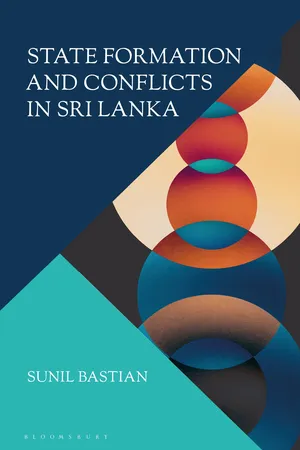
- 200 pages
- English
- ePUB (mobile friendly)
- Available on iOS & Android
State Formation and Conflicts in Sri Lanka
About this book
This book explores how the history of postcolonial Sri Lanka suggests a new paradigm for understanding state-formation as an ever-shifting and evolving process. The Sri Lankan state has formed under the pressure of multiple conflicts: around capitalist transition on the one hand, and the deteriorating relationship between the state and Tamil minority populations on the other. Sunil Bastian demonstrates the way these conflicts have overlapped, with international support for the introduction of neoliberal policies – from Japan, the West and institutions such as the World Bank and the IMF – helping to prop up a state engaged in armed ethnic conflict. State Formation and Conflict in Sri Lanka explores the role played by these two forces in the nation's recent economic crises.
Frequently asked questions
- Essential is ideal for learners and professionals who enjoy exploring a wide range of subjects. Access the Essential Library with 800,000+ trusted titles and best-sellers across business, personal growth, and the humanities. Includes unlimited reading time and Standard Read Aloud voice.
- Complete: Perfect for advanced learners and researchers needing full, unrestricted access. Unlock 1.4M+ books across hundreds of subjects, including academic and specialized titles. The Complete Plan also includes advanced features like Premium Read Aloud and Research Assistant.
Please note we cannot support devices running on iOS 13 and Android 7 or earlier. Learn more about using the app.
Information
Table of contents
- Cover
- Halftitle Page
- Dedication Page
- Title Page
- Contents
- List of figures
- List of maps
- List of tables
- Biography
- Acknowledgements
- Abbreviations
- Introduction
- 1 British colonialism and state formation
- 2 State formation in the first three decades of postcolonialism
- 3 From liberalization of the economy to negotiations through international mediation
- 4 Negotiations, their collapse and a new Sinhala nationalist leader comes to power
- 5 Post-war state
- References
- Index
- Imprint